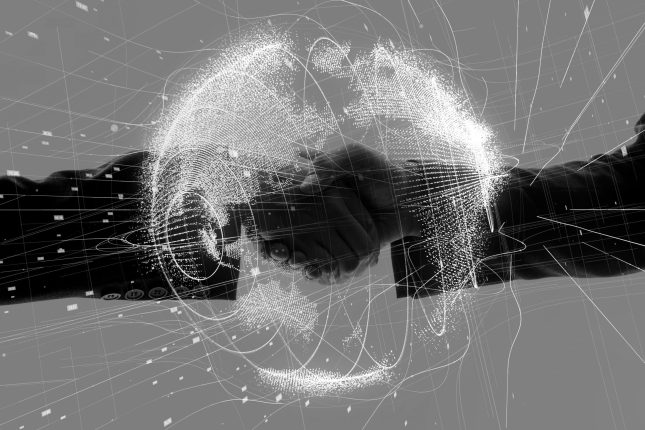
Blockchain in manufacturing: 3 opportunities and 3 threats
Your products move through a vast network of manufacturers, distributors and wholesalers before they reach the customer. You’re well aware that an issue at one of the nodes in your supply chain might disrupt the entire chain. Could blockchain in manufacturing be the solution?
Every link in the value chain needs correct, real-time information, shared rapidly between all parties. However, as in most supply chains, you are limited by the boundaries of traditional silo systems, where information is hardly shared between partners or even departments.
You probably know blockchain from the cryptocurrency bitcoin. But did you know that blockchain is a broader technology that keeps a record of every transaction, production step, sale, etc. of a product on a decentralized platform and makes it immediately available at every step?
This video below explains in a very clear and simple way how blockchain can make supply chain activities more transparent:
How can blockchain technology support your supply chain?
1. Single source of information. All information about a specific product or flow is instantly made available to every party involved in the supply chain.
As an example, Danish business conglomerate Maersk Line has built a blockchain solution that helps to manage and track shipping containers across the world by digitizing the end-to-end supply chain process. This can save the shipping industry billions of dollars by reducing admin costs and eliminating delays.
Similarly, blockchain also improves end-to-end processes with regard to quality control. Manufacturers and customers who buy parts will have all the info on the origin of each part and the certificates it holds. All this data will be captured on a single platform. The fact that customers can check the origin of the parts (and make sure, for instance, that no child labor was involved) can contribute to a more ethical production system (source: Karim Lakhani, Harvard Business Review, Feb 2017).
2. Accurate data throughout the whole network. Nowadays, information, instructions and documentation are often shared by email or across cloud applications and saved in different locations. This makes it almost impossible to ensure that documents are accurate and up-to-date everywhere.
For example, technical documents (e.g., instructions, SOPs, maintenance documents) are often revised. It can be a complex process to distribute the latest version to the entire organization and beyond. Thanks to blockchain technology, all the nodes will be updated in real-time, ensuring these documents are available to anyone who needs them.
3. Data protection. Information can be shared much more securely over the internet than in the traditional way (Excel files, EDI, etc.). This is due to blockchain cryptography, which requires anyone who wants to access the data to have the correct token.
- What about hacks? Although blockchain technology as such has proven to be impervious so far, this does not automatically mean full data protection. To avoid data being manipulated, blockchain needs an application layer where data security questions are dealt with, although you are still dependent on how well this layer is designed and for what purposes you want to use blockchain. In the past few weeks, blockchain technology has been hacked numerous times, resulting in the theft of millions of dollars’ worth of cryptocurrencies. ©Bravenewcoin
- What about the environmental cost? Blockchain builds on the fact that storing data is becoming very cheap, because rather than storing one version of the truth, all transactions are dispersed over multiple sources. However, this does not take into account the immense environmental cost of increased data creation. To give you an idea, the current data traffic in bitcoin alone is projected to use as much electricity as Denmark as a whole by 2020.
- Fewer “miners”, less security? Blockchain technologies, like bitcoin, rely on “mining” companies to generate the computer power they need to run complex algorithms to validate transactions. With that comes a fee. The “mining” business is eager to achieve economies of scale, leading to a fall in the number of mining companies. Isn’t this a contradiction? If the market were to evolve toward fewer mining companies, wouldn’t the validation of transactions become less secure?
At Bluecrux, we are excited about the promising future and the interesting features of blockchain that could revolutionize the industrial sector. However, we are aware that the technology is under development and still has to prove its worth. We’ll keep you posted!
Do you want us to take an enthusiastic—but critical—look at how we can make your supply chain more efficient? Get in touch!


